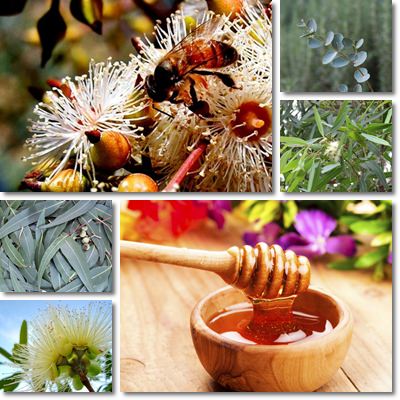Eucalyptus honey is a variety of honey made from the flower nectar of eucalyptus blossoms. The nectar is sourced by honeybees which then process it and make it into honey. The biggest producer of eucalyptus honey is Australia, where the largest populations of the tree species exist. The variety is regarded highly because of its strong flavor profile, but also health benefits, the most notable of which include a strong antibacterial activity, antioxidant action, energizing properties and beneficial effects on respiratory and other types of infections.
Like all honey varieties, eucalyptus too contains pollen from the blossoms. When honey bees collect nectar from the flowers, pollen sticks to their body too and is incidentally added to the resulting honey. If you are allergic to this particular pollen type, this makes you allergic to the honey too because it contains pollen as well. If you are not allergic to the pollen, but are to the enzymes honey bees secrete to make the honey, this makes you allergic to all honey varieties made by honey bees and to propolis. If you suspect you are allergic to eucalyptus honey or have exhibited symptoms of an allergic reaction in the past, it is vital to have a skin allergy test before eating the honey.

The concern for toxicity. Cineol, or eucalyptol, a compound that accounts for most of the aromatic profile of eucalyptus essential oil, has toxic effects when used in high amounts. There have been voices that suggest the honey too may have toxic potential on the grounds that aromatic compounds such as cineol from the plant may be lent to the honey and some people might eat significant amounts of it at once, risking ingesting too much of the compound. Indeed, honey bees may also collect honeydew from the tree, which accounts for the slight menthol fragrance of the resulting honey because natural oils may also be transferred to the honey along with the sugary honeydew.
However, eucalyptus honey is considered safe for consumption because such aromatic compounds are present in faint amounts, not nearly enough to make a difference. It’s eucalyptus oil that is saturated with volatile aromatic compounds and the reason why it should not be ingested, but employed for external use only, in amounts strictly adjusted by a medical professional.
What does eucalyptus honey look like? It is generally a medium dark color with a deep, saturated orange-brown pigment. The darker the color, the more pronounced its reddish reflexes. It can also be a lighter brownish orange color or light amber. The pigment can depend on the ratio of eucalyptus nectar compared to other floral sources, but also age of the honey, climate, weather conditions etc. Eucalyptus honeys from different parts of the world have been found to contain strawberry tree, citrus, rosemary, sunflower and several other pollen and nectar sources, which accounts for differences in color, taste and health effects. Also, freshly produced honey is liquid, but will crystallize shortly and take on a dull color.
What does eucalyptus honey taste and smell like? The variety has a soft texture and is quite aromatic. It has a medium-strong taste intensity and a flavor profile that combines warm, earthy tones with a damp, woody, caramel, slightly mentholated, faintly tart taste and moderate sweetness. It is best consumed raw, unfiltered and unheated, because processing of any kind, especially heating take away from its nutritional value and benefits.

What about the benefits?
What is eucalyptus honey good for? The strong-flavored, aromatic honey boasts multiple beneficial effects on human health. Here are the most notable 9 properties and health benefits of eucalyptus honey:
1) Natural antibacterial properties. Eucalyptus honey is a natural antibacterial and its action is supported by its content of hydrogen peroxide (a natural antimicrobial compound), low moisture, acidic (low) pH and antioxidant activity, all of which contribute to preventing the spread of bacteria and even reducing bacteria numbers at the site of the infection, hence the effectiveness of honey in improving wound healing time and speeding recovery.
2) Great for colds and flu. Eucalyptus honey appears to have a beneficial action on upper respiratory tract infections. Due to its natural antibacterial and anti-inflammatory properties, it helps reduce bacterial load and calm inflammation and irritation, improving sore throat discomfort. It helps suppress cough and boasts expectorant properties.
3) Immune-boosting properties. The reason why eucalyptus honey helps in the treatment of respiratory and other types of infections is due partly to its content of pollen with immunomodulating properties. Pollen from various plants has been shown to boost immune system activity and promote a faster recovery.
4) Good for urinary tract infections. Eucalyptus honey has been used as a natural remedy for treating mild urinary tract infections. Research indeed shows eucalyptus and other honey varieties can inhibit the growth of various bacteria, notably Staphylococcus aureus, Escherichia coli, Pseudomonas aeruginosa, including strains of bacteria that are antibiotic-resistant (A Comparative Study of Antibacterial and Antioxidant Activities of Wild Honey (Sunflower and Eucalyptus) and Commercial Honey).
5) Anti-inflammatory and fever-reducing properties. Eucalyptus honey is said to reduce inflammation and lower fever caused by respiratory tract infections, contributing to a faster recovery from illness. However, its effects are mild, not to mention the antibacterial activity of the honey varies between batches, seasons, depending on bees health, climate and weather conditions etc.
https://www.youtube.com/watch?v=xXOAz9ZCiyY
6) Rich in antioxidants. Eucalyptus honey too is a source of potent polyphenols and flavonoids, naturally-occurring compounds with a strong antioxidant activity. Antioxidants protect cells from damage and oxidative stress that could encourage the onset of inflammation, subsequent disease and premature aging. It is because of antioxidant that foods such as honey or dark chocolate are said to boast anti-aging effects.
7) Anticancer potential. A study suggests tricetin, a compound in eucalyptus honey and Myrtaceae pollen, appears to exert anticancer activity and stop lung cancer bone metastasis in patients with non-small cell lung cancer (Tricetin, a dietary flavonoid, suppresses benzo(a)pyrene‑induced human non‑small cell lung cancer bone metastasis). What is interesting is that this particular variety was used in the past as a natural remedy for tuberculosis treatment.
8) Source of vitamins and minerals with tonic effects. Eucalyptus honey is savory, energizing and contains trace amounts of several essential vitamins and minerals, notably vitamin C, potassium, copper, iron, calcium as well as amino acids, wax and pollen grains, all of which contribute to its nutritional value.
9) Natural treatment for digestive disorders. Taking eucalyptus honey with tea is said to help relieve constipation. Eating one tablespoon of the honey on an empty stomach in the morning is said to help heal stomach mucosa irritation and improve gastritis symptoms.
Eucalyptus honey for cataract treatment
There have been claims that raw eucalyptus honey can help with cataract, cure it to be more exact. Honestly, there is no proof, no scientific evidence it helps in the treatment of the condition if you eat it or apply it to the eye. Surgery is currently currently the only effective treatment for cataract.
Eucalyptus honey and pregnancy
Honey in general is considered safe during pregnancy. However, just to be sure, talk to your doctor first about any potential risks as only your doctor knows best about you and your baby. However, there is a general consensus among medical professionals that eucalyptus oil is potentially harmful for an unborn baby and should thus be avoided during pregnancy and whilst nursing.
Conclusion
Eucalyptus honey is a rather strong-flavored honey with multiple wonderful health benefits, from relieving cold and flu symptoms to promoting recovery following disease due to its tonic effects and nutritional value. In the spirit of a good therapeutic approach, the honey is best consumed raw and unheated, either added to teas or water or eaten as such, one tablespoon three or four times a day. For it to take effect, it is recommended to let it dissolve in the mouth and postpone eating and drinking anything for up to an hour so it can take effect. Anyone allergic to it should avoid consumption.
